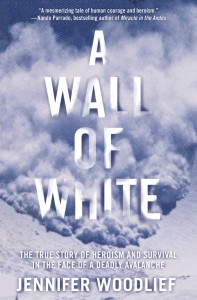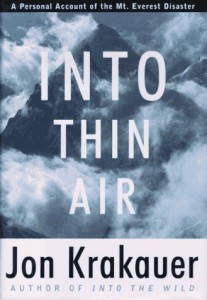Time for another pair of quick book reports…
Last week I picked up a disaster book that was on the New Books shelf of the Williamsburg library: A Wall of White: The True Story of Heroism and Survival in the Face of a Deadly Avalanche, by Jennifer Woodlief. 
(If you have to have a subtitle THAT long, maybe you ought to have a longer title instead? Although I should talk, since the subtitle of my upcoming book is “From the Conversion of Constantine to the First Crusade” and the subtitle of the corresponding kid’s history book is “History for the Classical Child, Volume 2, The Middle Ages, From the Fall of Rome to the Rise of the Renaissance, Revised Edition.”)
A Wall of White was OK, but not gripping; I skimmed through a bunch of pages to get to the end. Grade: C+
So this week I balanced it out with a disaster classic that I haven’t read for a while: Jon Krakauer’s Into Thin Air.  Grade: A+ on any scale.
Grade: A+ on any scale.
I’m in awe of Krakauer’s narrative. I find that disaster books encapsulate the challenge I have (in a much more sprawling way) in writing narrative history: how do you keep the pages turning when the end of the story is already ? Barbara Tuchman, a writer I much admire, says in Practicing History that she does her best work when she writes as if she didn’t know what was going to happen: Henry VIII won’t grow unhappy with this wife, the English will drive off those Norman invaders, the plague won’t spread across the known world. That’s a mental trick that doesn’t work at all for me. What’s astounding about Krakauer’s work is that he tells you right at the beginning of the book exactly what happens, who’s going to die, and how, and yet the narrative still holds you all the way through. Woodlief tries to create suspense by not revealing the end of the story…and it doesn’t work. I was bored.
There were a couple things I could point to: ill-timed digressions (Krakauer has plenty of digressions, but once events really start to accelerate he stays on task; Woodlief takes off three pages while a rescue dog is digging for a dying avalanche victim to tell us about the dog’s babyhood and training), clunky prose (“The final tumbler in the lock of their fate clicked smoothly into place.” You can use a metaphor if you only have to touch on it twice, but three times is flogging it), cliched language (“Jake was moved by the experience”). But I’m not sure that analyzing technique explains why Woodlief’s book flags while Krakauer’s drives relentlessly ahead. Into Thin Air comes out of some deep well that’s accessed by novelists more often than by writers of nonfiction.
Hmm, your response to Into Thin Air reminds me of my feelings reading Sebastian Junger’s The Perfect Storm. Even knowing the end of the book, even having seen the movie, I found it a gripping story. I even found myself stepping back occasionally to appreciate the historian’s craft that he brought to the book. To create a storyline where not only the end is known but almost none of the principles are around to interview is really a feat to enjoy.
“Tumbler in the lock of their fate”???????
I just finished reading Giles MIlton’s “Paradise Lost” [sorry, can’t figure out how to italicize here], about the destruction of Smyrna and the horrific loss of life there in 1922: another example of a writer who puts the end up front, then holds you glued to the pages as he backs up and starts the narrative proper. I also love “The Ghost Map” by Steven Johnson, about the London cholera epidemic. I realize of course that you are not writing about single/singular events and therefore your writing challenges are very different; but still, both these guys begin by presenting their readership with a known catastrophic ending yet manage to keep the suspense level very, very high. Both combine writing about personalities with larger social and historical issues. And their styles are elegantly straightforward. Although Milton can get a little long-winded, their are no “tumblers in the lock of fate” here!
Read on Twitter that you are using “The Martian Chronicles” for your writing series: I am so curious about how you are using it. Can you say? Is it for dictation, summary, what?
P.S. Please ignore egregious error in above comment: I meant “there are no tumblers in the lock of fate.” This is what happens when I am interrupted by a child while writing.
I’ve read Krakauer’s book at least 8 times and I wonder about this all the time, because it isn’t as if K is a stellar writer, is he? Yet this is probably one of my all-time favourite reads. It’s incredibly gripping.
Then you would like Terri Jentz’s Strange Piece of Paradise. Gripping, gripping read and you know what happens right away, but you still stick with her through the entire book and can’t get enough. I know I liked it because it was set in Central Oregon (where my entire family is from), but a really good memoir about facing death, survival, and healing. Her writing is incredible and she’s now one of those people I plan to meet someday just so I can shake her hand.
I loved Perfect Storm, too by Junger. Incredible book.
Trish L.
http://www.trishlawrence.com/blog
@trishlawrence
You might like this book http://www.amazon.com/Ice-Bound-Doctors-Incredible-Survival/dp/0786866845/ref=sr_1_1?ie=UTF8&s=books&qid=1246986113&sr=8-1 about a doctor’s survival in Antarctica – first, how she took care of scientists/engineers/mechanics/builders there with little to no medical supplies/equipment, and second, how she GOT supplies and trained her fellow “Polies” to care for her when she found she had cancer while there, and had no hope of getting out to civilization soon. Then there is the dramatic rescue at the end.
Ironically, I watched the movie a few weeks ago, then reserved the book from the library – the day before I was to pick it up, I heard on the news that she died that day.
BTW, I like those long subtitles – they give me more of a sense of what the book will be about.
Wondered if you were familiar with the site:
Goodreads.com??
Another site to spend time on….
Just pre-ordered my medieval history copy. Thank you, and can’t wait!